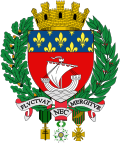
Back باريس في الحرب العالمية الثانية Arabic Německá okupace Paříže Czech Paris sous l'occupation allemande French Nemška okupacija Pariza Slovenian دوسری جنگ عظیم میں پیرس Urdu 二戰時期的巴黎 Chinese
This article needs additional citations for verification. (December 2022) |
| History of Paris |
|---|
 |
| See also |
|
|

The city of Paris started mobilizing for war in September 1939, when Nazi Germany and the Soviet Union attacked Poland, but the war seemed far away until May 10th 1940, when the Germans attacked France and quickly defeated the French army. The French government departed Paris on June 10th, and the Germans occupied the city on June 14th. During the occupation, the French government moved to Vichy, and Paris was governed by the German military and by French officials approved by the Germans. For Parisians, the occupation was a series of frustrations, shortages and humiliations. A curfew was in effect from nine in the evening until five in the morning; at night, the city went dark. Rationing of food, tobacco, coal and clothing was imposed from September 1940. Every year the supplies grew more scarce and the prices higher. A million Parisians left the city for the provinces, where there was more food and fewer Germans. The French press and radio contained only German propaganda.
Jews in Paris were forced to wear the yellow Star of David badge, and were barred from certain professions and public places. On July 16–17 1942, 13,152 Jews, including 4,115 children, were rounded up by the French police, on orders of the Germans, and were sent to the Auschwitz concentration camp. The first demonstration against the occupation, by Paris students, took place on November 11 1940. As the war continued, anti-German clandestine groups and networks were created, some loyal to the French Communist Party, others to General Charles de Gaulle in London. They wrote slogans on walls, organized an underground press, and sometimes attacked German officers. Reprisals by the Germans were swift and harsh.
Following the Allied invasion of Normandy on June 6 1944, the French Resistance in Paris launched an uprising on 19 August, seizing the police headquarters and other government buildings. The city was liberated by French and American troops on August 25th; the next day, General de Gaulle led a triumphant parade down the Champs-Élysées on August 26th, and organized a new government. In the following months, ten thousand Parisians who had collaborated with the Germans were arrested and tried, eight thousand convicted, and 116 executed. On April 29th and May 13th 1945, the first post-war municipal elections were held, in which French women voted for the first time.